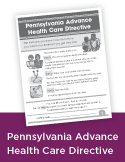Thinking about getting sick can be scary.
Sometimes people think the conversation is only for when you're sick or older. And, many times, our loved ones feel uneasy talking about the subject. But having a conversation about advance care planning is very important.
Even though it's hard, the best time to talk about it is now. It's easier than waiting until you become ill.
Having the time for discussion and reflection can often help families and loved ones understand each other’s views about end of life care.
Tips for Starting the Conversation
- Use conversation starters: articles, TV shows, movies, or current events.
- Other triggers include sermons, funerals, and medical checkups. Even talking about the death of someone you know can help get you started.
- Talk about your values — what makes your life worth living and what you consider quality of life.
- Approach the conversation wanting to share your wishes before you ask someone else to share their own wishes.
- Be prepared to have more than one conversation or that the subject may cause an emotional reaction. This is ok.
Examples of Conversation Starters
Sharing your health care wishes with someone else:
- “I know that this isn’t easy to talk about, but if I get sick or have an accident — and can’t make medical decisions for myself — I'd like to share what would be important to me, so you could be my decision maker.”
Asking someone else their wishes:
- “I have also been wondering what would be most important to you if you were not able to speak for yourself? Would you want the doctors to try aggressive treatments, even if they wouldn’t cure you, to give you more time? Or would you rather have doctors manage your pain or disease so you feel better but might not live as long? Would you rather be in a hospital or at home? Who would you want to be around you?”
- “Thinking about getting sick can be scary. If this is too much to talk about right now, could you at least think about these things so that we could discuss them later?”
- After a movie or news story: “What would you want us to do if you were in this situation?”
- “While I was in the doctor’s office, I saw a form called the “Pennsylvania Advance Health Care Directive.” Would you be interested in reading it so we could discuss it later?”
Advance Care Planning Resources
From our Health Library

















